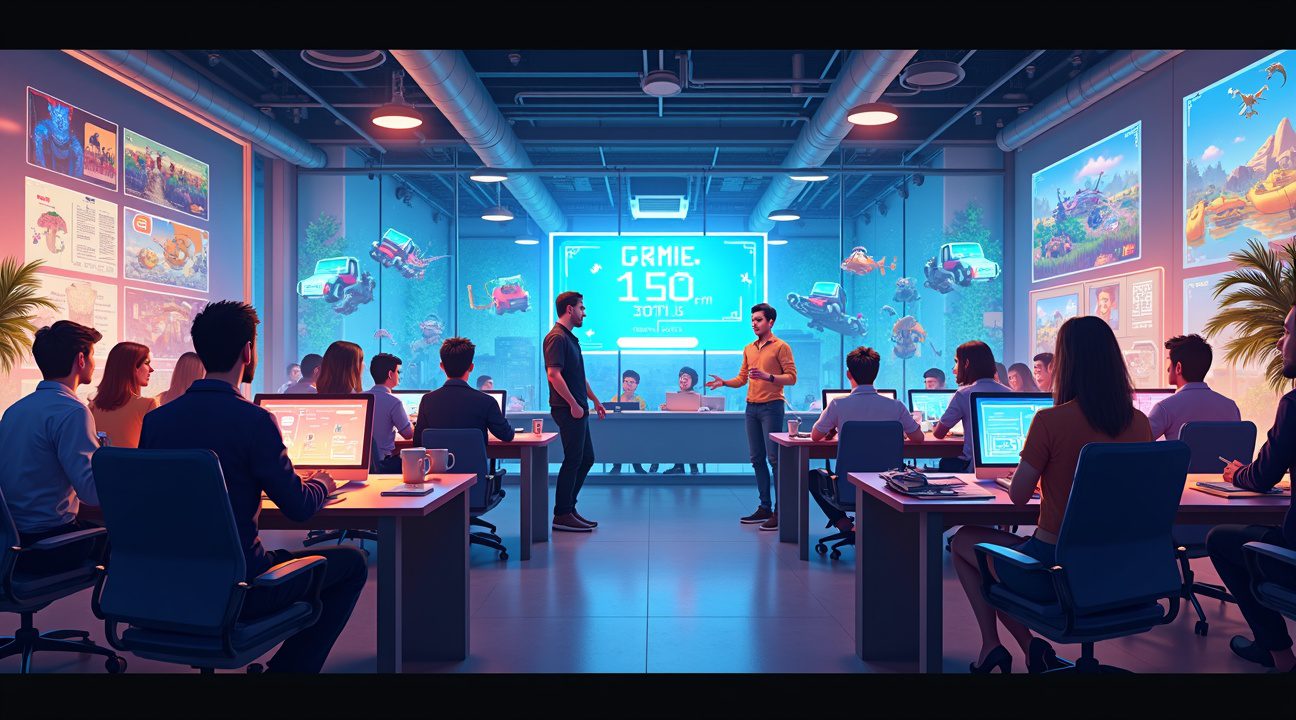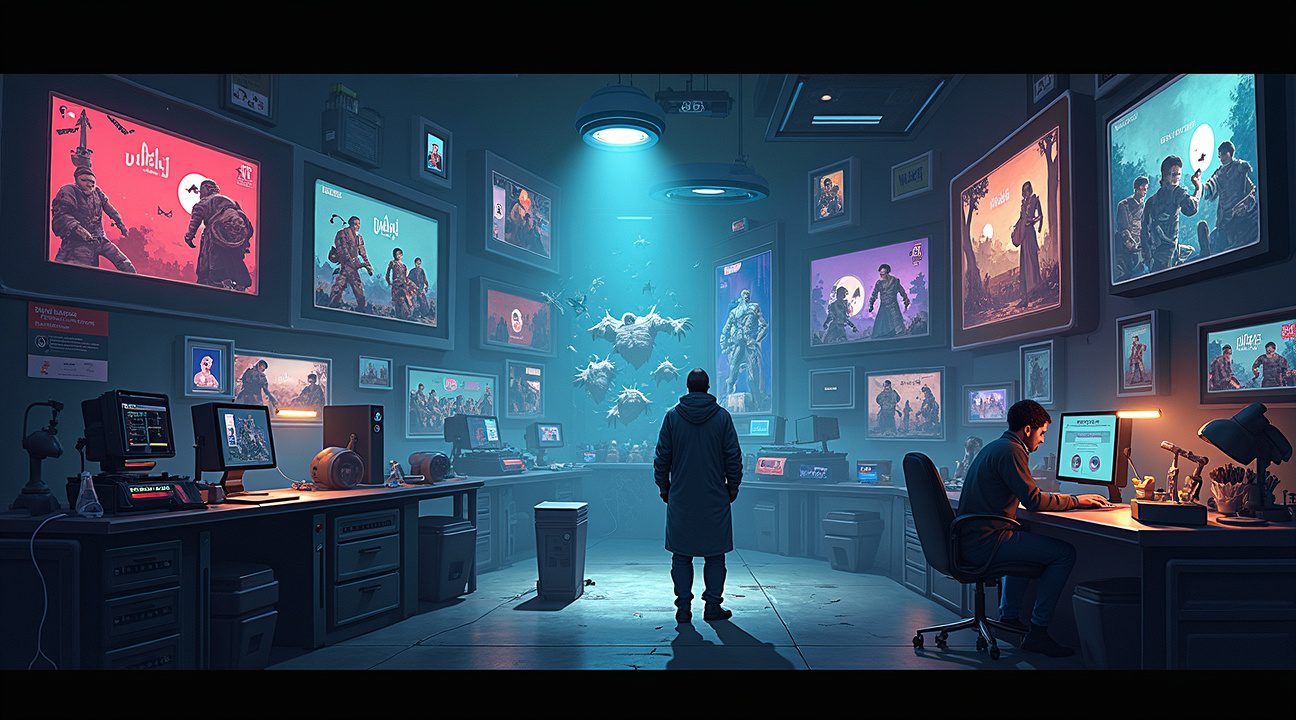The gaming industry is facing a pivotal moment as Pocketpair, the studio behind Palworld, publicly commits to a firm anti-AI publishing policy, banning games with generative AI elements and marking a key philosophical stance in modern game development.
Key Takeaways
- Pocketpair refuses to publish any games containing generative AI, also rejecting Web3 technologies and NFTs.
- The studio’s new publishing division received over 150 game submissions in its first week, showing strong developer interest.
- John Buckley warns platforms like Steam will soon be flooded with poor-quality AI-generated games within the next two to three years.
- Pocketpair’s anti-AI approach contrasts sharply with industry leaders like Microsoft and Krafton who support AI integration.
- Allegations persist that Palworld incorporates AI, but Pocketpair continues to deny these claims and uses them to reinforce their publishing principles.
Pocketpair’s Strong Ethical Stance on Game Development
As generative AI tools infiltrate development pipelines across the globe, Pocketpair has taken a strong and remarkably rare stance in today’s gaming market. Led by Communications Director John Buckley, the studio defines its approach as one rooted in creative integrity rather than temporary market trends.
The company’s policy does more than influence its in-house projects; it shapes the entire publishing pipeline. Pocketpair actively screens all submissions, rejecting any content that contains machine-generated code, artwork, or other assets. This method ensures their platform becomes a haven for creators who value human craftsmanship.
Market Dynamics and Developer Response
This anti-AI and anti-Web3 philosophy resonates with many independent developers. By refusing to support generative technologies, Pocketpair has tapped into a growing movement of creators skeptical of automation’s impact on artistry.
The launch of Pocketpair’s publishing division was met with immediate interest—more than 150 pitches in the first week alone—showing a real appetite for platforms that honor traditional creative processes.
Platform Concerns and Industry Implications
John Buckley has not shied away from making stark predictions. He has warned that platforms like Steam may soon be overwhelmed by low-effort AI-cloned titles, putting strain on moderation systems and ultimately eroding the gaming experience for users and developers alike.
Pocketpair’s strategy could become a competitive advantage, drawing in creators looking for authenticity and human-centric publishing policies. This stands in sharp contrast to companies like Microsoft and Krafton, which embrace AI to reduce costs and accelerate development timelines.
Palworld Controversy and Philosophical Integrity
The controversy surrounding Palworld only intensifies the studio’s anti-AI rhetoric. Although accusations claim AI tools were used in its development, Pocketpair firmly denies these allegations. Rather than obscure the issue, the company uses the scrutiny to bolster its credibility and make a strong case for intentional, human-driven creativity in game publishing.
The Larger Cultural Divide
Pocketpair’s position isn’t just a business or branding decision—it reflects a broader cultural debate about creativity in the digital age. While some view AI as a tool to be leveraged, others, like Pocketpair, see it as a threat to the essence of artistic work. Their publishing success could set precedents for the industry at large.
Future Outlook for Anti-AI Policies
The early success of Pocketpair’s publishing division suggests there’s a solid community of developers aligned with this philosophy. Still, questions remain about long-term viability in a rapidly evolving industry. If Pocketpair can remain competitive while holding firm to its values, it may pave the way for a new kind of publisher centered on preserving human creativity.
The entire gaming sector is watching closely. Pocketpair’s commitment—not only to games without AI, but also to an overall vision for human-first development—could shape the future policies of many studios and publishing platforms.
Pocketpair Refuses to Publish Generative AI Games: “We Don’t Believe in It”
Pocketpair’s stance on generative AI couldn’t be clearer. The studio behind the wildly successful creature-collecting game has drawn a firm line in the sand against publishing titles that incorporate generative artificial intelligence. Their position stems from a fundamental philosophy that shapes their entire publishing approach.
Communications Director John Buckley has consistently reinforced this stance across multiple platforms and interviews. His messaging remains unwavering: Pocketpair simply doesn’t believe in generative AI technology for gaming applications. This isn’t a temporary policy or market-driven decision—it reflects the company’s core values about game development and creative integrity.
Comprehensive Opposition to Emerging Technologies
Pocketpair’s rejection extends beyond just generative AI. The studio maintains an equally strong position against Web3 technologies and NFT integration in submitted games. This comprehensive approach demonstrates their commitment to traditional gaming experiences without blockchain-based or artificially generated content.
Developers seeking publication through Pocketpair must understand these requirements from the outset. Games submitted for consideration cannot contain any generative AI elements, regardless of how minimal or supplementary they might appear. The studio’s transparency about these restrictions helps potential partners understand expectations before investing development time.
Clear Guidelines for Developers
The publishing requirements create specific parameters for game creators interested in working with Pocketpair. Developers need to evaluate their projects against these criteria early in the development process. Games utilizing procedural generation through traditional algorithms remain acceptable, but any content creation through AI models falls outside their publishing scope.
Buckley’s consistent communication across public appearances reinforces that this position isn’t negotiable. The studio prefers clarity over confusion, ensuring that developers understand these boundaries before submitting their work. This approach prevents wasted time on both sides and maintains the integrity of Pocketpair’s publishing catalog.
Their stance reflects broader industry conversations about AI’s role in creative processes. While some studios embrace generative technologies for asset creation or procedural content, Pocketpair has chosen a different path. They believe traditional development methods produce more authentic gaming experiences that align with their creative vision.
This position significantly impacts how developers approach Pocketpair as a potential publisher. Studios must carefully audit their development pipelines to ensure no generative AI components exist in their games. The restriction covers everything from AI-generated art assets to procedurally created narrative content through machine learning models.
Pocketpair’s New Publishing Division Overwhelmed with 150+ Game Pitches in First Week
Pocketpair has established its own publishing division early in 2025, creating a dedicated platform to support independent developers working to bring their games to PC through Steam. This strategic expansion demonstrates the studio’s commitment to fostering creativity within the indie gaming community while building a diverse portfolio beyond their flagship title.
The response from developers has been overwhelming. Within just seven days of launch, the publishing arm received more than 150 game pitches from independent studios worldwide. This flood of submissions indicates significant confidence in Pocketpair’s ability to help smaller developers navigate the competitive gaming market and reach broader audiences.
Several titles have already found homes under this new publishing umbrella. Truckful, developed by MythicOwl, represents one of the first partnerships to emerge from this initiative. Dead Take from Surgent Studios has also secured support, alongside Normal Fishing by The Bworg. Each of these projects showcases the variety of experiences that Pocketpair is willing to champion through its publishing efforts.
Major Projects on the Horizon
The publishing division isn’t just focused on external partnerships. Two significant internal projects are generating considerable anticipation among fans and industry observers:
- Palworld version 1.0 represents the full release of the studio’s breakout hit, transitioning from early access to a complete gaming experience
- Palfarm, a spinoff title that expands the Palworld universe into new gameplay territories and mechanics
The success of this publishing venture reflects Pocketpair’s growing influence in the gaming industry. By supporting indie developers, the studio is positioning itself as more than just a game creator—it’s becoming a platform for emerging talent to flourish. This approach allows Pocketpair to diversify its revenue streams while maintaining its core development focus.
Independent developers often struggle with the business aspects of game publishing, from marketing strategies to distribution logistics. Pocketpair’s publishing division addresses these challenges by providing resources, expertise, and established relationships within the industry. The overwhelming response in the first week suggests that many developers have been waiting for exactly this type of support.
The variety of games already signed—from trucking simulations to fishing experiences—indicates that Pocketpair isn’t limiting itself to specific genres or themes. This broad approach allows the publishing division to cast a wide net and discover unique gaming experiences that might otherwise struggle to find their audience.
Looking ahead, the challenge will be managing this influx of submissions effectively while maintaining quality standards. With 150+ pitches in just one week, the team will need to develop efficient evaluation processes to identify the most promising projects without missing potential gems hidden in the pile.
The timing of this publishing launch aligns well with broader trends in the gaming industry. Independent developers continue to create innovative experiences, but many lack the resources to market and distribute their work effectively. Pocketpair’s entry into publishing fills this gap while leveraging the studio’s newfound prominence following Palworld’s success.
This publishing initiative also serves as a natural extension of Pocketpair’s existing capabilities. The studio has already demonstrated its ability to create engaging content and build communities around its games. These skills translate well to supporting other developers’ projects and helping them reach their target audiences.
The early success of this publishing division suggests that Pocketpair has identified a genuine need in the market. Independent developers clearly want partners who understand both the creative and commercial aspects of game development. By offering this support, Pocketpair is creating value for developers while building a sustainable business model that extends beyond their own game creation efforts.

Warning of “Low-Quality, AI-Made Games” Flooding Steam in Next 2-3 Years
John Buckley has issued a stark warning about the gaming industry’s immediate future. He predicts that Steam and other major platforms will face an overwhelming influx of low-quality, AI-generated games within the next two to three years. This forecast stems from growing concerns about how artificial intelligence tools are being misused in game development, potentially compromising the creative integrity that defines exceptional gaming experiences.
The Creative Authenticity Crisis
Buckley argues that this anticipated surge could fundamentally damage the authenticity and creative depth that serious game developers work hard to achieve. Players have already begun expressing skepticism about games that rely heavily on AI-generated content, questioning whether such titles offer genuine artistic value or simply represent quick cash grabs. The concern extends beyond individual games to affect the broader gaming ecosystem, where discerning quality titles from AI-generated content becomes increasingly challenging.
I believe this trend reflects a fundamental misunderstanding of what makes games compelling. While AI tools can serve as helpful assistants in certain development tasks, they can’t replace the human creativity, emotional intelligence, and cultural understanding that drive truly memorable gaming experiences. Pocketpair’s position on AI reflects this philosophy, emphasizing their commitment to maintaining creative authenticity.
Pocketpair draws a clear distinction between supporting creative autonomy and enabling the rapid, minimal-effort workflows that AI tools often facilitate. The studio recognizes that meaningful game development requires time, deliberate design choices, and genuine human insight into player psychology and storytelling. These elements can’t be effectively automated without sacrificing the very qualities that make games engaging and emotionally resonant.
Industry Response and Platform Policies
Steam has responded to these industry-wide concerns by implementing new disclosure requirements for developers. The platform now mandates that game creators explicitly reveal any AI usage in their titles, signaling a shift toward greater transparency and heightened scrutiny for digital authenticity. This policy change reflects growing awareness that players deserve to know how their entertainment is created.
The new disclosure requirements serve multiple purposes beyond simple transparency:
- They help players make informed purchasing decisions.
- They encourage developers to critically evaluate their use of AI tools.
- They protect the integrity of creative development practices.
Rather than viewing AI as a shortcut to bypass creative challenges, developers must now consider whether AI usage aligns with their artistic vision and player expectations.
This policy shift also protects legitimate developers who invest significant time and resources in crafting original content. By clearly identifying AI-generated elements, platforms can help distinguish between thoughtfully developed games and those produced through automated processes. The change acknowledges that while AI has legitimate applications in game development, wholesale reliance on these tools often produces inferior results.
Industry observers note that this disclosure requirement may actually accelerate the quality divide between AI-generated and traditionally developed games. Players who understand the differences between these approaches can make more informed choices, potentially driving market demand toward titles that demonstrate genuine creative investment. This natural selection process could help address Buckley’s concerns about platform flooding by making low-effort AI games less commercially viable.
The gaming community’s response to these developments will likely shape future industry standards. As players become more educated about AI usage in games, their preferences will influence how developers approach these tools. Studios that prioritize creative authenticity and transparent development practices may find themselves with significant competitive advantages in an increasingly crowded marketplace where distinguishing quality becomes paramount.

Industry Split: Pocketpair’s Anti-AI Stance Contrasts Sharply with Tech Giants’ AI Push
Pocketpair’s firm rejection of generative AI places the studio at odds with industry giants who continue to double down on artificial intelligence integration. While the Palworld developer takes a principled stand against AI-generated content, major publishers and tech companies push forward with aggressive AI adoption strategies.
Krafton exemplifies this divide through its heavy investment in Agentic AI and automation technologies. The PUBG creator actively develops AI systems designed to streamline game development processes and enhance player experiences. This approach represents a fundamental philosophical difference from Pocketpair’s human-centric development model.
Microsoft‘s substantial financial commitments to AI research and implementation further highlight the industry’s split perspective. The tech giant continues making bold investments that position artificial intelligence as central to future gaming experiences. These contrasting approaches create a clear line between studios prioritizing human creativity and those embracing technological automation.
Creative and Economic Concerns Drive Opposition
Critics across the gaming industry raise significant concerns about AI’s potential impact on both employment and artistic integrity. Several key issues fuel this opposition:
- Job displacement threatens developers, artists, and writers as automated systems potentially replace human talent
- Creative homogenization risks reducing the unique artistic vision that defines memorable gaming experiences
- Quality concerns emerge as AI-generated content may lack the nuanced understanding that human creators bring to storytelling and design
- Ethical questions surround the use of existing creative works to train AI systems without proper compensation or consent
Many independent studios and industry veterans view Pocketpair’s stance as refreshing compared to the rapid AI adoption happening elsewhere. These developers argue that human creativity remains irreplaceable in crafting emotionally resonant gaming experiences.
The division reflects broader questions about technology’s role in creative industries. While proponents argue AI tools can enhance productivity and reduce development costs, opponents like Pocketpair maintain that authentic human expression drives the most compelling interactive entertainment. This fundamental disagreement shapes how different companies approach game development and positions them on opposite sides of an increasingly important industry debate.
Palworld Faces Persistent AI Allegations Despite Developer Denials
Pocketpair continues to grapple with accusations that Palworld incorporates AI-generated content, despite the studio’s clear stance against using generative AI in game development. The allegations have persisted since the game’s launch, creating an ongoing challenge for the developers who maintain their commitment to traditional asset creation methods.
John Buckley has acknowledged the difficulty of addressing these persistent claims, noting that critics often remain unconvinced regardless of the studio’s explanations. Rather than engage in public disputes that might amplify tensions, Buckley has chosen a more restrained approach. This strategy reflects an understanding that responding aggressively to accusations can sometimes backfire and draw more unwanted attention to the controversy.
Gaming Community’s Growing AI Vigilance
The scrutiny Pocketpair faces represents a broader shift within the gaming community, where players have become increasingly watchful for signs of AI involvement in game development. This heightened awareness stems from legitimate concerns about AI’s potential impact on creative industries and employment. However, this vigilance sometimes results in unfounded accusations against studios that haven’t used AI tools.
Several factors contribute to these misidentifications:
- Visual similarities between hand-crafted assets and AI-generated content can be difficult to distinguish
- The rapid advancement of AI technology has made players more suspicious of polished or unusual artistic styles
- Social media discussions can amplify suspicions without proper verification
- Some players may conflate efficient development practices with AI assistance
Pocketpair’s experience demonstrates how studios can find themselves defending against AI allegations even when they’ve explicitly rejected these technologies. The company’s position creates an interesting paradox where their public opposition to AI hasn’t shielded them from continued suspicion. This situation highlights the challenges developers face in an environment where AI concerns have become deeply embedded in gaming discourse, making it increasingly difficult to separate fact from speculation in public discussions about development practices.
Pocketpair Predicts Market Shift Toward “Games Made by Actual Humans”
Pocketpair stands firm in its belief that consumers will increasingly gravitate toward games crafted entirely by human developers. The studio anticipates a significant market shift where authenticity becomes a key selling point, distinguishing human-created content from AI-generated alternatives.
Consumer Demand for Authentic Gaming Experiences
Gaming enthusiasts are showing heightened awareness about development methods, and Pocketpair expects this trend to accelerate. Players want to know that real people poured creativity, passion, and genuine artistic vision into their favorite titles. This growing consciousness creates opportunities for studios that can guarantee human-only development processes.
The company’s leadership views their anti-AI stance as more than an ethical choice—it’s a strategic business decision. While competitors experiment with automation tools, Pocketpair doubles down on human talent and creative problem-solving. This approach sets them apart in an industry where AI adoption continues expanding across various development stages.
Competitive Advantage Through Human Creativity
Pocketpair positions its commitment to human development as a unique selling proposition. The studio emphasizes that their games contain genuine human insight, emotional depth, and creative solutions that AI cannot replicate. Their flagship title Palworld exemplifies this philosophy, showcasing the innovative thinking that emerges from collaborative human teams.
The game’s success across multiple platforms—including PlayStation 5, Xbox Series X|S, Xbox One, and PC via Steam—demonstrates that audiences respond positively to authentic human creativity. Pocketpair believes this success validates their approach and signals broader market acceptance of their development philosophy.
By maintaining strict human-only development standards, Pocketpair aims to build lasting relationships with players who value transparency and authenticity. The studio expects that as AI becomes more prevalent in gaming, their commitment to human creativity will become increasingly valuable to discerning consumers who seek genuine artistic expression in their entertainment choices.
Sources:
Game8: “Palworld’s Pocketpair Gives a Hard No to Generative AI”
WindowsCentral: “Gaming’s AI crossroads: PUBG maker leans in, Palworld pushes back—here’s what’s going on”
PC Gamer: “Palworld studio Pocketpair says its new publishing division won’t handle games that use generative AI: ‘We don’t believe in it'”
80.lv: “Palworld Maker Won’t Publish Games That Use Generative AI”
GamesRadar: “Palworld publishing lead ramps up his crusade against AI games, says you’re huffing pure copium if you think this is going anywhere—and games like Megabonk will continue to body this for the next 50 years.”
Game Developer: “‘We don’t believe in it:’ Palworld maker Pocketpair won’t publish games that use generative AI”


